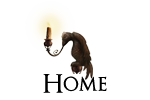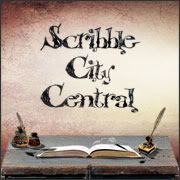Tamora Pierce says she couldn't put Alison Croggon's Pellinor series down. Neither could I--and the trouble was that I started reading just as the first one was published, so I had to bite my nails and wait for years to see what happened in the end (there are four books altogether and it was worth the wait). In the meantime, I contacted Alison to say how much I was enjoying her writing. Personally, I'm always happy to get fanmail (always surprised too) and reply at once, but somehow, when I write to another author, I never expect a response--perhaps seeing them as much more grown up and important and busy than me. This is stupid, I know. Anyway, I was altogether delighted when Alison wrote back from the Land of Oz. Eventually, after emailing back and forth for a while, we met up for a long and chatty lunch in London, and I am now the proud possesor of a full set of signed copies of Pellinor. It's hard to put a finger on what I like so much about these books, but for a start it'll do to say that they're quite different and unique. Yes, there's a hint of Tolkien's Middle Earth, a smidgen of the ice tales of the Edda, a soft breath from a myriad mythical cultures--but the final mix is all Alison's own, and very rich and satisfying it is too. As soon as I started planning these Mythic Interview Fridays I knew I wanted Alison to take part because I reckoned that no one could have written the books she has without a knowledge of and love of all things mythological. I was absolutely right, and I'm delighted to share her wide-ranging, thoughtful and knowledgeable answers with you. Over to you now, Alison--and thanks for being my first Australian guest on Scribble City Central.
1. Do you think that the retelling of Greek and other myths is important or relevant for the children of today? Why should they care about some “dry old stories” which come from ancient cultures they might never even have heard of?
We all have an endless appetite for stories, and myths are a bottomless source of stories that resonate deeply within us. Everyone plunders them because they give us narrative and symbolic shapes in which to speak about basic human mysteries – birth, death, change. And like all good stories, they give us pleasure. Why should young people miss out on all that richness?
Writers always retell stories for their own times, and most of those stories are, when you dig behind them, very old. At the moment my husband (the playwright Daniel Keene) and I are co-writing the script for a piece of music theatre for young people for the Bell Shakespeare Company here in Australia. We decided to take the stories from Ovid’s Metamorphoses, just as Shakespeare did for his own plays; but we’re distorting their language and imagery to suit our own purposes. Because they’re myths – stories of transformation, that talk about human impulses such as love, greed, desire, fear, joy and so on – they give us enormous scope for our own imaginations. It’s proving to be enormous fun.
2. What age were you when you came across your first myth or myths? Tell us how you felt then about the myths you first discovered. Did you love them or hate them? Did they scare you, excite you—or were you indifferent? What kind of myths were they? Greek? Norse? Native American? Celtic? Or from another culture entirely? Were they in a book you read? Or did you hear them as oral storytelling from someone else?
I was a child when I discovered the Greek myths. I loved them. Maybe because they were beautiful and strange and ancient: they are about being human, but they are also about the world that is not us, and that we can’t control. My father used to tell me the Greek myths as bedtime stories when I was very young, about five or so. I still remember him telling me the story of Perseus and the Medusa. I didn’t realise until I was a little older that it was a Greek myth; I just thought it an exciting and strange tale. When I was about nine years old, I was given a book of Greek myths, which was illustrated with photographs of ancient Greek artefacts – beautiful bracelets and statues and vase paintings. For about a year it was my favourite book. I became obsessed with Greek myths – I went so far as to despise the Romans for copying the Greek stories, as mere johnny-come-latelys, and insisted on the gods’ proper Greek names. I still correct myself if I say Venus instead of Aphrodite....
After that I read through every book of myths I could get my hands on. The next obsession was Norse myth. Then Aboriginal myths. And so on. I still read them.
3. Looking back, what is your favourite myth of all time, from any culture? And why would you choose it?
I think that would have to be the Welsh story of Blodeuwedd, which is in the Mabinogion. I’ve written several poems about it. In the original tale, a king called Lleu Law Gyffes is cursed by his mother, who says he will never marry a human wife. Because he’s lonely, the wizard Gwydion makes him a woman, Blodeuwedd, from the flowers of broome, meadowsweet and oak. She falls in love with another man, Gronw Pebyr, and together they plot to murder Lleu and run away together. Gwydion finds out about the crime when Lleu, in the form of an eagle with carrion dropping from his wings, flies away to find him, and punishes Blodeuwedd by turning her into an owl.
It fascinates me, because of the tragic conceit of a woman who is literally created by a man for a man, but who nevertheless has her own desires. In such a circumstance, they can’t but turn deadly. It’s a compelling metaphor for how men have created the idea of femininity, which out of its powerlessness has become something predatory.
4. Who is your most hated mythical hero or heroine, and what made you feel that way about them?
I’ve never hated any hero or heroine. It seems a bit odd to do so: I think one of the charms of myths is that they are amoral, like the natural world itself is. It would be a bit like hating mountains or deserts. (Mind you, Loki’s murder of Baldr is a prime piece of bastardy.)
5. Is there a mythical beast you are particularly fond of? If so, which one?
Not especially. I think I’ve always been fascinated by animals of every type, real or mythical. Some of the real ones are as strange as anything that has been imagined.
6. How have myths had an influence on your writing life, if at all?
They’ve informed my writing from the very beginning. It’s possible that they’re the reason I began to write.
7. If you could choose to be the demigod child of any one mythical god or goddess, which one would it be? Which power would you like to inherit from them—and what would you do with it?
On my desk I have a few figures of the elephant-headed god Ganesha, an Indian deity worshipped as the Lord of Beginnings and Remover of Obstacles. He is also the god of storytellers. I guess I want the power to tell stories!
More about Alison:
Alison Croggon is a writer who lives in Melbourne, Australia. Her novels include the acclaimed Books of Pellinor, a fantasy quartet released in Australia, the UK, the US and Europe, and is currently almost at the end of a new novel, Black Spring. She is the prize-winning author of several collections of poems, of which the most recent is Theatre (Salt Publishing, 2008). She works as a theatre critic for the national daily newspaper, The Australian, and keeps a review blog, Theatre Notes (http://theatrenotes.blogspot.com/). Last year she won the 2009 Geraldine Pascall Critic of the Year award.
You can find Alison on Twitter and her website is at http://alisoncroggon.com/
Friday, 21 May 2010
Mythic Interview Friday: Number 8 - Alison Croggon
Labels:
Alison Croggon,
Lucy Coats,
Mythic Interview Fridays,
myths,
Pellinor
Subscribe to:
Post Comments (Atom)

















5 comments:
Great interview, Lucy and Alison. Am off to hunt down Alison's books right now - and delighted to find that I'm not the only one to have Ganesh watching over me as I write!
Thank you for introducing me to a new writer, Lucy, to add to Philip Womack. I hadn't heard of the Pellinor books so will chase them up when I come out of Booktrust purdah!
You are both in for a huge treat, Nicky and Mary. Here's the comment Amanda Craig left on Facebook/networkedblogs:
"Lovely interview Lucy! I agree, an unusually good fantasy writer."
She most definitely is!
great interview and yet more books to add to my tbr pile.
Curses on you, Lucy Coats!
C'mon, Jo, you know you love me really. Who else can you turn to for those Really Excellent additions to your ever-growing pile? And what is life without More Books? :-)
Post a Comment